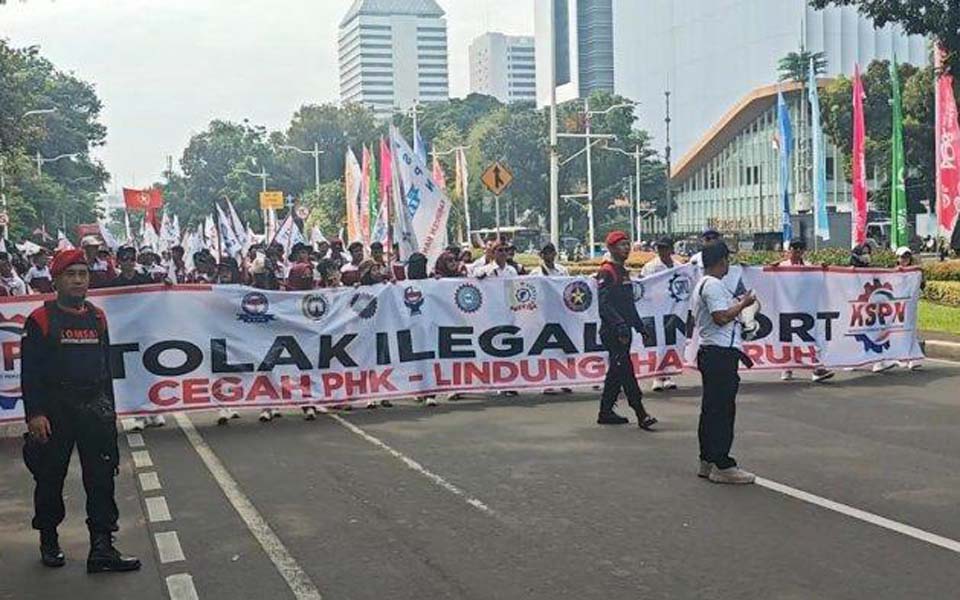Jakarta – The threat of a wave of dismissals as a consequence of the global crisis is beginning to be concretely felt by the manufacturing sector. As of Thursday November 20, the government has received requests from several companies that plan to dismiss 12,600 workers and lay of at least 1,200 more.
The request to carry out the dismissals was conveyed to the monitoring and socialisation team overseeing the Joint Ministerial Decree on Preserving the Momentum of National Economic Growth and Anticipating Global Economic Developments1.
The majority of companies that submitted the request are labour intensive industries located in West Java, West Kalimantan, Riau, East and Central Java.
Anticipating even worse impacts from the crisis, the government followed up the report by sending in a mediating team to the companies. The team, led by department of labour officials will mediate negotiations between employers and labour representatives in order to seek an optimal solution.
One of the companies that made such an announcement is PT Riau Andalan Pulp and Paper (RAPP), which plan to dismiss 1,000 employees and lay off 1,000 more. According to RAPP Executive Director Rudi Fajar, the decision will begin taking effect this Friday.
The decision was taken by RAPP’s management, said Fajar, because the pulp and paper company is experiencing a lack of raw material supplies and is also being hit by a flow on effect of the global crisis. “This choice represents the final option after the company carried out expenditure cost saving in various areas,” said Fajar.
The employees that will be subject to dismissals and lay offs, according to Fajar, come from all different levels. In addition to Indonesian labourers, around 35 foreign workers will also be subject to the policy. As of yesterday, the RAPP employed around 4,000 workers.
The industrial situation in the Purbalingga regency of Central Java faces three related problems. “Currently in the handicraft industry, particularly wood, production levels have declined by 30 percent as consequence of the crisis”, said Mukodam, the head of Industrial Affairs at the Purbalingga Trade and Industry Office.
Handicraft products such as picture-framing, wood trays, laminating and wardrobes are exported to Australia, the United States and Japan. “Export orders from these countries have stopped. We don’t know how long it will be postponed”, said the owner of Jasmin Craft, Arif Purnomo.
In response to this situation, Forestry Minister MS Kaban has stated that the government will endeavour to assist the forestry industry by easing licensing, the supply of raw materials and other incentives. The government hopes that these efforts will be able to save the forestry industry.
Seeking a breakthrough
When contacted on Thursday evening, Labour and Transmigration Minister Erman Suparno explained that the mediation team will be pushing for bipartite talks while seeking a breakthrough to avoid dismissals. Suparno is asking workers who wish to take part in the mediation process to be patient.
“Dismissals have their procedures, starting from a company proposal to the government, verification of the problems, the reasons, aims and inspection of companies. The dismissals are only valid after the labour offices has approved them”, said Suparno.
Confederation of Prosperity Labor Union (KSBSI) President Rekson Silaban said that unity between trade unions and employers in anticipating the impact of the global crisis cannot be shirked.
“The threat of a recession is before our eyes, trade unions must no longer make a fuss about non-substantial issues. The biggest challenge at the moment is how to save companies so that they don’t fall into bankruptcy and we can still work”, said Silaban.
Seven companies critical
Worrying news is also coming from the Nusantara Bonded Zone (KBN) in North Jakarta. The global financial crisis has started to have and affect upon the export activities of industries and factories in the KBN. The latest news is that seven garment factories orientated towards exports to the US are threatened with closure.
According to North Jakarta Mayor Effendi Anas, he will be soon reporting on the actual labour conditions in his area to Jakarta Governor Fauzi Bowo. This is in order to anticipate the possibility of social unrest as a consequence of company plans to carry out dismissals.
Aside from these seven companies, around 50 businesses in North Jakarta have ceased activity. Out of this total, 16 companies with a work force of as many as 9,600 employees are located in the KBN.
However the secretary of PT KBN, Sentot Yoga Tamtomo, asserted that not one company has yet closed or gone out of business in 2008. Moreover, Tamtomo claimed that he does not know about the seven companies in the KBN that are in a critical condition as a consequence of a lack of orders.
PT KBN covers three business zones, KBN Cakung with 100 investors, KBN Marunda with 40 investors and KBN Tanjung Priok with 8 investors. Around 90 percent of the investors in the three zones are garment producers, 85-90 percent of which export to the US. (ham/hrd/han/CAL)
Notes:
1. The Joint Ministerial Decree (SKB-4) signed by Labour and Transmigration Minister Erman Suparno, Trade Minister Mari Elka Pangestu, Industry Minister Fahmi Idris and Home Minister Mardiyanto on October 24, limits laborers’ wage from exceeding the rate of economic growth and is expected to discourage local administrations from raising regional minimum wages beyond the capabilities of manufacturing firms.
[Translated by James Balowski.]















